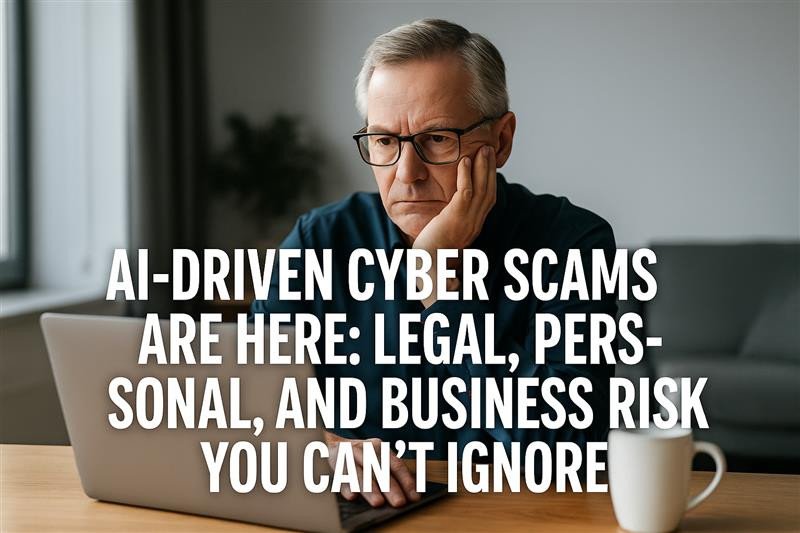AI-Driven Cyber Scams Are Here: Legal, Personal, and Business Risks You Can’t Ignore
Imagine receiving an urgent voice note from your company’s CFO requesting approval for a high-priority fund transfer. The voice is professional, familiar—exactly what you hear in board meetings.
But it’s not real.
It’s AI-generated—cloned from a webinar publicly available online—executing a scam with chilling precision. The sender’s name, designation, and context are all checked out. By the time the deception is uncovered, the funds are gone.
Welcome to the new era of AI-driven cybercrime- a brave new world where the line between human and machine is blurred, and cybercriminals are exploiting this fog to target everyday people.
What is AI-Driven Cyber Scams?
AI-driven scams involve fraudsters leveraging artificial intelligence to automate, personalize, and escalate fraudulent schemes. These scams are highly convincing, difficult to detect, and capable of scaling at unprecedented speed.
Common Variants Include:
Voice Cloning Scams: Impersonating a loved one or executive to request urgent action or funds.
Deepfake Videos: Fabricated videos of public figures or acquaintances delivering misleading messages.
Chatbot Fraud: AI bots mimicking customer service or romantic partners to elicit sensitive information.
AI-Enhanced Phishing: Emails or messages customized with personal data scraped from online sources.
Who’s Most at Risk?
Cybercriminals use AI to tailor scams to specific vulnerabilities.
Key targets include:
Executives & Employees – Invoice fraud, CEO voice spoofing, deepfake emails.
Elderly – Emotional voice clone calls or fake emergency pleas from “grandchildren.”
Students – Job scams, fake college admissions, loan assistance frauds.
Small Businesses – Vendor impersonation, social engineering, AI-crafted financial emails.
Real-Life Scenarios: How They Target Individuals and Businesses
- The Business Invoice Trap
An AI system mimics your supplier’s writing style and sends an invoice with a new bank account. Believing it’s legitimate, you wire ₹15,000—directly into a scammer’s hands.
- The “Emergency Call” from a Relative
A call from your nephew—allegedly arrested abroad—sounds authentic. The voice, tone, and urgency are perfect. But it’s an AI clone.
- The Fake Job Interview
AI-generated recruiters schedule a video interview. You provide your résumé, identification, and bank details for “onboarding.” The job? A complete fabrication.
AI Scams Are Global—and Hard to Prosecute
AI-powered scams are often launched from foreign jurisdictions, making investigation and prosecution complex. In cases with international elements, Mutual Legal Assistance Treaties (MLATs) or Interpol red notices may be required to pursue offenders across borders.
Safeguards: Legally Sound, Consumer-Friendly Tactics
1. Establish a Family Code Word
• Choose a private phrase only close family members know.
• Use it to verify real emergencies. No code, no action.
2. Enable Multi-Factor Authentication (MFA)
• Apply MFA on all banking, email, and social accounts.
• Prefer authentication apps over SMS.
3. Limit Oversharing Online
• Avoid posting voice notes, birthdays, or pet names (common password recovery clues).
• Review privacy settings across all social platforms.
4. Pause and Verify
• Scammers rely on urgency to bypass your judgment.
• Independently verify via a secondary channel before acting.
5. Educate Vulnerable Groups
• Brief children, seniors, and less tech-savvy individuals.
• Review suspicious messages together and share best practices.
What Are the Chances of Recovery?
Time is critical. If reported within Timeline, some banks may reverse unclaimed funds or flag recipient accounts for tracing. Recovery is not guaranteed, but early action improves the odds.
Legal Recourse: If You’ve Been Scammed
As legal professionals specializing in cyber fraud, we emphasize that early legal action can significantly increase the chances of recovery or containment.
File a Cybercrime Complaint
• Visit India’s National Cyber Crime Reporting Portal.
• Alternatively, report to the nearest police station or cyber cell.
Inform Your Bank Immediately
• Request a freeze on transactions and raise a fraud dispute.
• Banks governed by RBI must act swiftly on UPI/NEFT frauds.
Preserve Digital Evidence
• Save all emails, call logs, screenshots, and transaction receipts.
Report to CERT-In (Indian Computer Emergency Response Team)
• Mandatory for businesses under data protection norms.
• Also crucial for corporate incident documentation.
Know Your Legal Rights
• The Information Technology Act, 2000 and IPC sections apply.
• If systemic negligence is suspected, consult counsel for filing a legal notice or FIR.
Corporate Implications
For businesses affected by AI scams (e.g., invoice fraud or impersonation), consider:
• Notifying SEBI (if listed),
• Conducting a digital forensics audit,
• Exploring contractual liability and civil remedies.
Practical Tip
Always file an FIR—even if recovery seems unlikely. Why?
• It establishes an official record.
• Required for insurance claims, internal audits, and dispute resolutions.
• Enhances the chance of fund recovery before withdrawal by fraudsters.
